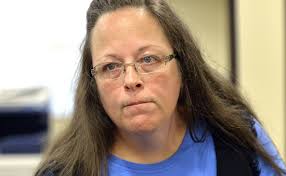
Introduction
Kim Davis, a former county clerk from Kentucky, gained national attention in 2015 for her refusal to issue marriage licenses to same-sex couples. This incident not only ignited a heated debate over religious freedom but also brought into focus the intersection of law and personal belief systems in America. Davis’s actions became a pivotal moment in the ongoing discussion about LGBTQ+ rights and religious liberty.
The Incident That Sparked Outrage
In June 2015, the U.S. Supreme Court ruled in Obergefell v. Hodges that same-sex marriage is a constitutional right. Following this landmark decision, Kim Davis, who identifies as a devout Christian, publicly stated that issuing marriage licenses to same-sex couples would violate her religious beliefs. Consequently, she ceased issuing any marriage licenses altogether, claiming that she would rather face legal consequences than act against her convictions.
In September 2015, Davis was jailed for five days for contempt of court after refusing to comply with a court order to issue the licenses. Her release was met with a wave of support from various religious and political groups, who viewed her as a martyr standing up for religious freedom. This event highlighted the complexities faced by public officials who grapple with personal beliefs and legal obligations.
Public Reaction and Legal Implications
The backlash against Davis was significant, with many LGBTQ+ advocates expressing anger at her refusal to follow the law, which they viewed as an infringement on civil rights. Protests and legal challenges ensued, demonstrating the deep divisions within American society regarding marriage equality and religious freedom.
Following her release from jail, Davis gathered widespread media coverage, appearing at various rallies and events, including those hosted by prominent conservative figures such as former Arkansas Governor Mike Huckabee. Her situation raised compelling questions regarding the extent to which personal convictions should influence public service, sparking legal discussions about the protections granted under the First Amendment.
The Ongoing Debate
As of now, Kim Davis has stepped back from the national spotlight but remains a prominent figure in discussions surrounding religious liberty and LGBTQ+ rights. Her case has served as a reference point in legal debates about the rights of public officials versus the rights of individuals seeking to exercise their constitutional freedoms.
Conclusion
Kim Davis’s refusal to issue marriage licenses remains a significant chapter in the history of America’s culture wars. It represents the broader tension between religious beliefs and civil rights, impacting ongoing discussions about tolerance and acceptance in society. As debates on these issues continue, the significance of her actions and their implications for both religious freedom and LGBTQ+ rights will likely remain relevant moving forward.




